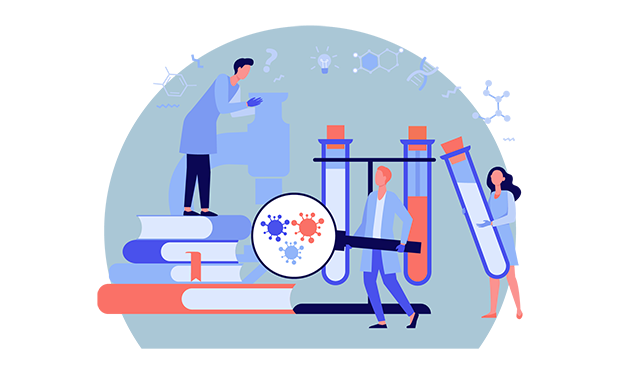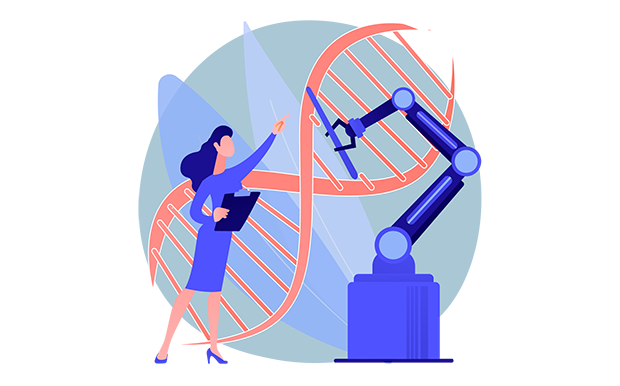Genetic Testing
for Mental Health
When most people think about genetic testing, they associate it with the possibility of developing certain health conditions, the likelihood that their offspring would be at risk for certain hereditary diseases. Yet one area that people are just starting to learn more about is genetic testing for mental health. Atlanta Integrative Psychiatry offers genetic testing to help individuals better understand their mental health disorders.


How Does Genetics Relate to Mental Health?
Genetics plays an important role in mental health. Genetic variations can affect how the brain develops, how it functions, and its response to stress and other environmental factors. It is believed that these genetic changes can play a role in the development of mental health disorders such as depression, anxiety, bipolar disorder, OCD, ADHD, and schizophrenia.
What Is Genetic Testing for Mental Health?
Genetic testing for mental health is a process that involves testing an individual's DNA to look for any genetic mutations or changes that are associated with mental health disorders. In addition, this type of testing can help identify certain genetic mutations that can increase an individual's risk of developing a mental health disorder.
It can also provide information on how these genetic variations may affect an individual's response to certain types of therapies or medications. For example, in the past, psychiatrists and their patients would have to try numerous medications until they found one that worked well for the individual.
With genetic testing, the number of different medications can be reduced based on genetic factors. As a result, patients might only need to try a few medications before finding one that works best for them and their mental health.
How Can Genetic Testing Help My Mental Health?
Genetic testing for mental health helps identify pharmacogenetic markers. These markers help determine what medications would be ineffective and which could be effective at treating a person’s mental health condition. As a result, psychiatrists can further customize a patient’s treatment and care plan using these pharmacogenetic markers.
Furthermore, genetic testing helps show how various drugs will interact within an individual. For example, psychiatrists will know how fast medications metabolize and whether a patient will be drug-resistant or could have potential side effects.
Other ways genetic testing can help your mental health include the following:
- It can provide insight into your risk of developing a mental health disorder.
- It can provide valuable information to assist your psychiatrist in further customizing your treatment plan and care.
- It can help you identify other family members at risk for the same mental health disorder.
- It can help you better understand your condition and how best to manage it.

- Who Is a Good Candidate for Genetic Testing?
- Are There Any Side Effects of Genetic Testing?
- Is Genetic Testing Effective?
- How Is Genetic Testing in Atlanta Done?
Anyone who is concerned about their mental health or has a family history of mental health disorders may benefit from genetic testing. Genetic testing can help new patients just starting psychiatric care or existing patients without success with various medications.
Generally, no side effects are associated with genetic testing for mental health. However, it is essential to note that the test results can be emotionally distressing for some people. Therefore, it is important to speak with a psychiatrist before taking a test to discuss the potential implications of the results.
For example, genetic testing can sometimes uncover other health issues the person is unaware they have. This could add further distress to someone already getting help for their mental health disorder. However, the benefits the testing provides can help the individual address any health issues should they arise.
Yes, genetic testing for mental health can be an effective tool in helping to identify genetic variations that can increase an individual’s risk of developing a mental health disorder. However, it is essential to remember genetic testing for mental health does not replace other treatment methods and options.
Sometimes, the test results may only help provide insights into how certain medications could react. Furthermore, genetic testing is still a relatively new tool that is being used to help diagnose and treat mental health disorders. As such, other factors also need to be considered when using genetic testing, such as:
- The overall health and well-being of the person.
- The person’s lifestyle choices.
- Any current medications one may be taking.
- One’s dietary and nutritional needs.
- The frequency one exercises.
Research is ongoing to better understand the connection between genetics and mental health, and more information is becoming available as advancements in genetics research are made.
At Atlanta Integrative Psychiatry, genetic testing involves taking a swab of saliva from the inside of the cheeks. After the sample is collected, it is processed at a laboratory or genetic testing facility. The test results are usually available within three to five days.
The testing process looks for any genetic mutations, markers, or changes associated with mental health disorders. The testing process also evaluates the effectiveness of various medications used to treat mental health disorders.
A psychiatrist or genetic specialist then reviews the test results to help provide guidance on how to interpret the results and what they mean for the individual’s mental health and treatment.
Get Genetic Testing to Customize Your Mental Health Care
The professionals at Atlanta Integrative Psychiatry has been using genetic testing to help patients customize their mental health care for a number of years. For further information about genetic testing or to schedule an initial consultation appointment, please feel free to contact us today and schedule an appointment.
Sources:
Oslin DW, Lynch KG, Shih M, et al. (2022). Effect of Pharmacogenomic Testing for Drug-Gene Interactions on Medication Selection and Remission of Symptoms in Major Depressive Disorder: The PRIME Care Randomized Clinical Trial.
Richman, M. (2022). Genetic Testing May Benefit Patients with Depression.
Wisner, W. (2022). Can You Inherit a Mental Illness?
You are not alone. You deserve to get help.
Atlanta Integrative Psychiatry is an Industry leader in mental health treatment . Our team of top medical experts specialize in dual diagnosis treat and are committed to ensuring that each patient is treated as an individual.
Call us today, we're avialable 24/7.




